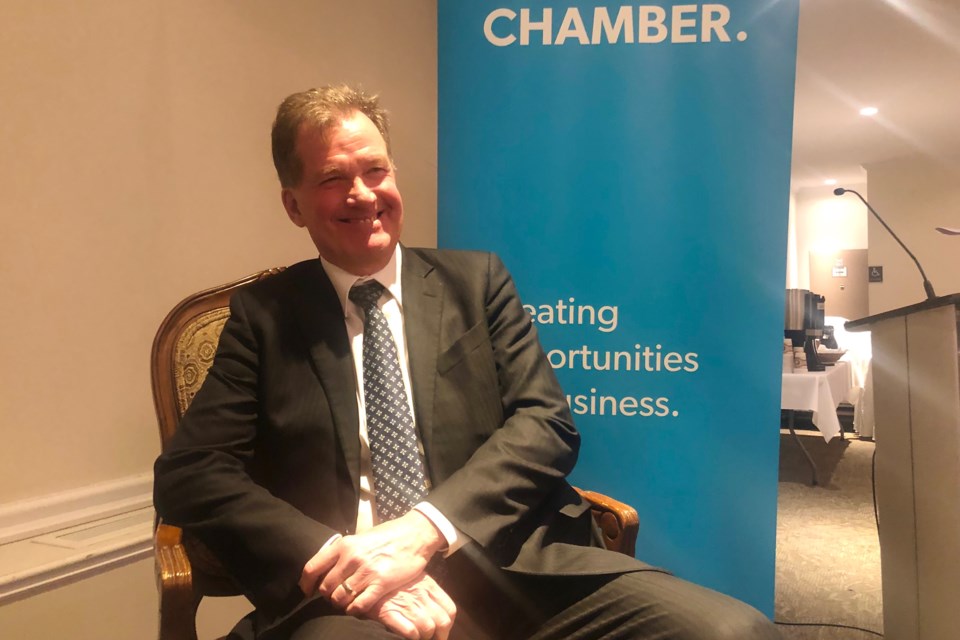Before delivering his third State of the City speech in a year's time, there's one thing Timmins Mayor George Pirie would like to see happen.
He's hoping the large industrial players in town will come to a consensus on a bypass road.
“I think that’s entirely doable and can be done,” he said.
The need for a bypass is one of the items Pirie talked about today in his 2020 State of the City address at an annual lunch hosted by the Timmins Chamber of Commerce. About 200 people attended the almost hour-long speech at the Porcupine Dante Club that also touched on topics like homelessness, opioids, and crime.
“Hopefully they’ll take away that there’s a need to talk within the city constructively about the tough issues. There are some issues that are impacting the city and we need to have those conversations and arrive at a consensus to the solutions,” said Pirie after the meeting.
For the bypass, in his address Pirie said the city is wasting good money replacing infrastructure without having the conversation about it not achieving maximum life because of the ore and logging trucks.
“There has been an obvious need for a bypass in Timmins for years. A few attempts have been made at making this happen, but obviously it has not. We can see the results every single day of excessive heavy truck traffic on infrastructure which was not built to handle it,” he said.
For large industrial users, Pirie estimated it could mean an additional $3 million per year to get their feeds to the mill.
“My disappointment is that our large industrial users do not seem to be able to develop a consensus on doing this,” he said.
“The city owns the land and there is no shortage of material to do the job.”
He suggested industrial users could create a fund over the next three to four years for a private access road.
“Failing that, then the city will have to explore different alternatives, ways and means, to create this funding, perhaps toll roads,” he said.
He noted a private service road for heavy trucks could go south of the city.
“It is largely built already if you think from the Hollinger pit to the other side of the Pamour and I’m positive that Newmont would be a positive partner in this,” he said.
Pirie also talked about what he called the "tough social issues."
“First to everyone who has suffered harm from crime, I have a great deal of empathy for you. There’s no greater sense of violation than if your car or in particular your home has been broken into and I empathize that you feel your community is less safe,” he said.
The opioid crisis, he said, isn't going away and the pressures on the social systems will increase.
“Two of the deaths that we have suffered in this town related to this crisis were individuals in their late 50s and early 60s. This is not a youth crisis, this is a crisis within our society. This is having a direct effect on the cost of running our DSSAB, the EMS service, as the crisis calls have doubled in three years,” he said.
Pirie said they have to get in front of the problem. One way he suggested is by the weekly situation table analyzing data so an intervention officer can go to expected trouble spots.
As the homeless numbers grow in the region, Pirie said the issue here is unique.
"Ninety per cent of our homeless are Indigenous. Many of these individuals arrive here with effects of generations of failed attempts at social engineering from the senior levels of government,” he said.
He noted the disparity in homelessness funding.
The Cochrane District Social Services Administration Board (CDSSAB) receives $648 per person, whereas he said areas like Thunder Bay, Sault Ste. Marie, Sudbury and North Bay get $5,500 to $7,500 per person.
He said there needs to be more provincial and federal funding.
“The Indigenous populations are moving from federally-funded jurisdictions. Simply put, the funds have to follow the feet,” he said.
While Pirie didn't go into crime statistics, he talked about proactive measures like Lock It or Lose It. He said the most progressive thing is the Community Safety and Well-Being Plan currently being developed.
He talked about the recent armed robbery with a knife at a gas station in Timmins, where the suspect was arrested and charged shortly after, but the courts granted him bail the same night.
“The TPS did their job, the criminal justice system failed them,” he said. “We can address this problem by writing your provincial reps, telling them this has to change. Moreso, you should be doing this with any other contact you have within any other city - this is fundamentally wrong.”
Pirie said people have to take back their neighbourhoods.
"There’s no possibility of the TPS to be in all places at all times. Neighbourhood watches used to be a standard thing, so make sure you have gatherings and get to know your neighbours,” he said.



